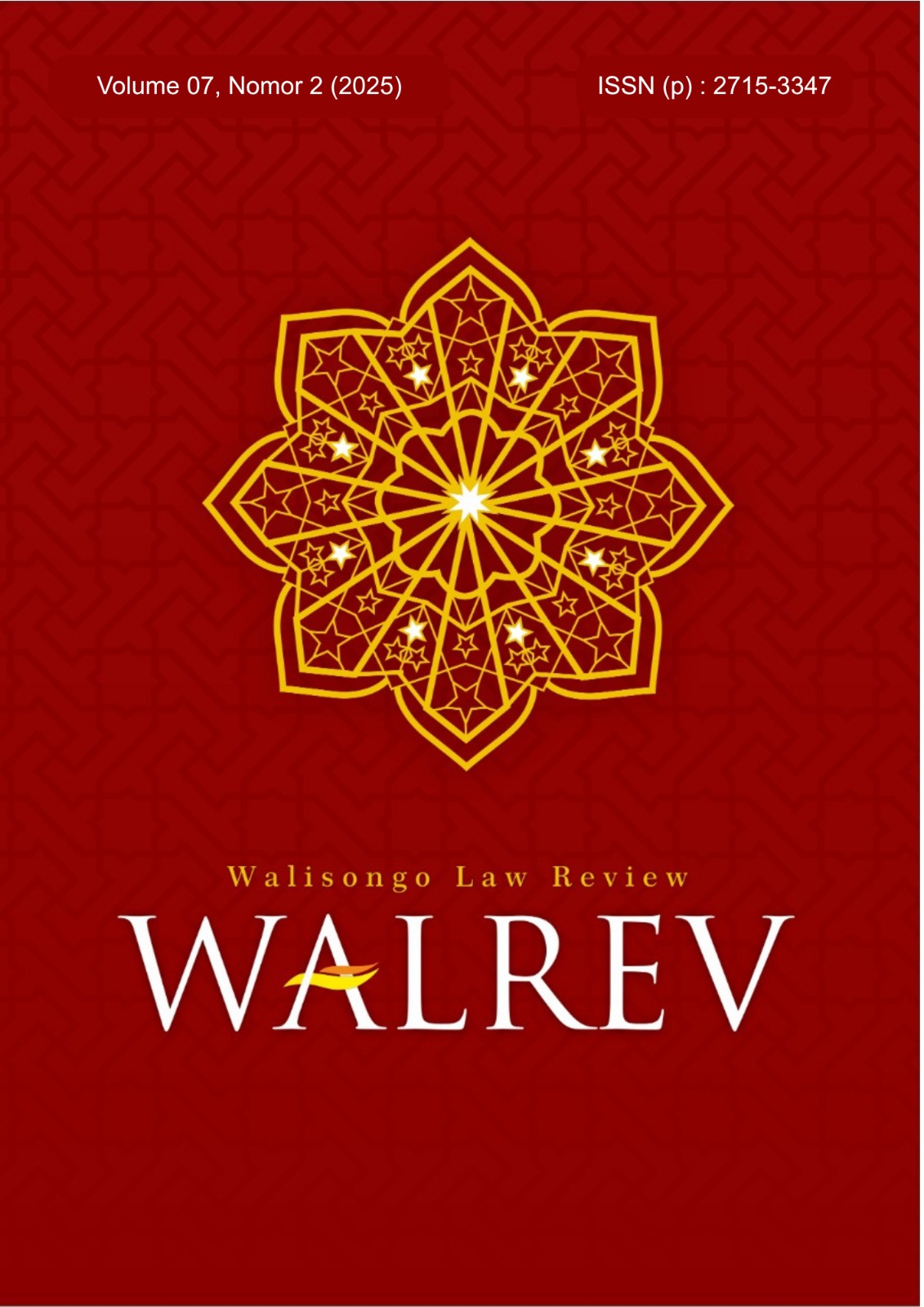Criminal Law and Islamic Perspectives on The Death Penalty in Parental Murder Cases
DOI:
https://doi.org/10.21580/walrev.2025.7.2.28829Abstract
The death penalty for the murder of a child by a parent is subject to differing standards of justice and proportionality between positive law and Islamic law. This disparity requires in-depth study and analysis of judicial rationality and criminal proportionality. This study assesses the rationality of the judge’s considerations and the proportionality of the death penalty in Mandailing Natal District Court Decision No. 40/Pid.B/2025/PN Mdl (parricide murder) from the perspective of Islamic criminal law, with a focus on qishash and maqashid al-shariah. The method used is normative legal research with a doctrinal and judgment study approach; the analysis materials include a copy of the verdict, the Criminal Code, fiqh literature, and contemporary studies analyzed descriptively-qualitatively and comparatively. The results show that the panel formally assessed the fulfillment of the elements of premeditated murder so that the verdict led to the death penalty according to Article 340 of the Criminal Code. Textually, the elements of qishash were fulfilled and the victim's family did not grant forgiveness, but weaknesses in forensic and psychiatric evidence reduced factual certainty, which is an important prerequisite under Islamic criminal law before applying a commensurate punishment.
Hukuman mati dalam kasus pembunuhan yang dilakukan anak terhadap orang tuanya memiliki standar keadilan dan proporsionalitas hukuman yang tidak sama antara hukum positif dan hukum Islam. Kesenjangan ini memerlukan kajian dan analisis mendalam tentang rasionalitas yudisial dan proporsionalitas pidana. Penelitian ini menilai rasionalitas pertimbangan hakim dan proporsionalitas pidana mati dalam Putusan PN Mandailing Natal No. 40/Pid.B/2025/PN Mdl (pembunuhan orang tua oleh anak) dari perspektif hukum pidana Islam, dengan fokus pada qishash dan maqashid al-shariah. Metode yang digunakan adalah penelitian hukum normatif dengan pendekatan doktrinal dan studi putusan; bahan analisis meliputi salinan putusan, KUHP, literatur fikih, dan kajian kontemporer yang dianalisis secara deskriptif-kualitatif dan komparatif. Hasil menunjukkan majelis secara formal menilai terpenuhinya unsur pembunuhan berencana sehingga vonis mengarah pada pidana mati menurut Pasal 340 KUHP. Secara tekstual unsur qishash terpenuhi dan keluarga korban tidak memberi pengampunan, namun kelemahan bukti forensik dan psikiatrik mengurangi kepastian faktual sebagai prasyarat penting menurut hukum pidana Islam sebelum menerapkan hukuman setimpal.
Keywords: Death Penalty; Islamic Criminal Law; Murder of Parents; Proportionality; Rationality
Downloads
References
Abdillah, Junaidi, Tri Nurhayati, Najichah Najichah, Lira Zohara, and Muchammad Tholchah. 2024. “Contribution Model of Al-Mas’ūliyyah Al-Jinā’iyyah in the Formulation of Criminal Liability in Indonesia’s New Criminal Code.” Al-Ahkam 34 (2): 367–92. https://doi.org/10.21580/ahkam.2024.34.2.22592.
Absar, Absar Aftab. 2020. “Restorative Justice in Islam with Special Reference to the Concept of Diyya.” Journal of Victimology and Victim Justice 3 (1): 38–56. https://doi.org/10.1177/2516606920927277.
Ad-Damisyqi, Syaikh al-’Allamah Muhammad bin ’Abdurrahman. 2010. Fiqih Empat Mazhab. Edited by Irwan Kurniawan. Translated by ’Abdullah Zaki Alkaf. 13th ed. Bandung: Hasyimi.
Agusta, Evelin Nur, Pujiyono Pujiyono, Nabitatus Sa’adah, and Aista Wisnu Putra. 2025. “A Juridical Study of the Death Penalty for Premeditated Murder in the Perspective of Indonesian Criminal Law Reform.” Jurnal Pembangunan Hukum Indonesia 7 (1): 98–117. https://doi.org/10.14710/jphi.v7i1.98-117.
Alam, Syariful, Nu’man Aunuh, and Yaris Adhial Fajrin. 2024. “The Concept of Restorative Justice in Islamic Criminal Law: Alternative Dispute Settlement Based on Justice.” KnE Social Sciences 9 (1): 642–651. https://doi.org/10.18502/kss.v8i21.14779.
Alotaibi, Hajed A. 2021. “The Challenges of Execution of Islamic Criminal Law in Developing Muslim Countries: An Analysis Based on Islamic Principles and Existing Legal System.” Cogent Social Sciences 7 (1). https://doi.org/10.1080/23311886.2021.1925413.
Amrullah, M. Arief. 2024. “Paradigm Shift of Death Penalty Regulation Inthe New Criminal Code (KUHP) of Indonesia.” Lentera Hukum 11 (1): 24–55. https://doi.org/10.19184/ejlh.v10i1.45809.
Ariyanti, Vivi, and Supani. 2024. “Examining Muslims’ Aspirations in Drafting the New Criminal Code: Analyzing Criminal Law Policy in Indonesia from a Maslaha Perspective.” Al-Manahij: Jurnal Kajian Hukum Islam 18 (1): 37–58. https://doi.org/10.24090/mnh.v18i1.8280.
Benuf, Kornelius, and Muhamad Azhar. 2020. “Metodologi Penelitian Hukum Sebagai Instrumen Mengurai Permasalahan Hukum Kontemporer.” Gema Keadilan 7 (1): 20–33. https://doi.org/10.14710/gk.2020.7504.
Budiyanto, Budiyanto, Valentino Pamolango, and Deppa Ringgi. 2024. “The Essence of the Teaching of Causality in Revealing Deaths Due to Premeditated Murder.” SASI 30 (2): 198–215. https://doi.org/10.47268/sasi.v30i2.1904.
Butt, Simon. 2020. “Aceh and Islamic Criminal Law in the Courts.” In Crime and Punishment in Indonesia, edited by Tim Lindsey and Helen Pausacker, 535–58. London: Routledge. https://doi.org/10.4324/9780429455247-26.
Damura, Fahira Ode, Josina Augustina Yvonne Wattimena, and Popi Tuhulele. 2025. “The Practice of the Death Penalty in Middle Eastern Countries Reviewed from the Perspective of International Law.” Balobe Law Journal 5 (1): 1–13. https://doi.org/10.47268/balobe.v5i1.2414.
Djalaluddin, Muhammad Mawardi, Bulqia Mas’ud, Dedy Sumardi, Isnawardatul Bararah, and Kamus Kamus. 2023. “The Implementation of Ta’zīr Punishment as an Educational Reinforcement in Islamic Law.” Samarah: Jurnal Hukum Keluarga dan Hukum Islam 7 (1): 399. https://doi.org/10.22373/sjhk.v7i1.15101.
Fahim, Md. Hasnath Kabir. 2022. “Hudud Punishment under Islamic Criminal Jurisprudence: An Overview.” Journal of Law and Human Rights 2 (2): 106–13.
Fardiansyah, Ahmad Irzal. 2021. “Why Indonesia Maintain Capital Punishment?” Fiat Justisia: Jurnal Ilmu Hukum 15 (1): 25–38. https://doi.org/10.25041/fiatjustisia.v15no1.1904.
Fatoni, Syamsul, Erma Rusdiana, Imron Rosyadi, and Opik Rozikin. 2025. “Asas Proporsionalitas: Perspektif Hukum Positif Dan Maqosid Syariah Dalam Sistem Peradilan Pidana.” Jurnal Hukum IUS QUIA IUSTUM 32 (1): 46–71. https://doi.org/10.20885/iustum.vol32.iss1.art3.
Fragkou, Kallirroi, Ioannis Ketsekioulafis, Athina Tousia, Maria Piagkou, Flora Bacopoulou, Panagiotis Ferentinos, Pierre-Antoine Peyron, Eric Baccino, Laurent Martrille, and Stavroula Papadodima. 2025. “From Fragile Lives to Forensic Truth: Multimodal Forensic Approaches to Pediatric Homicide and Suspect Death.” Diagnostics 15 (11): 1383. https://doi.org/10.3390/diagnostics15111383.
Freiberg, Arie. 2021. “Bridging Gaps, Not Leaping Chasms: Trust, Confidence and Sentencing Councils.” International Journal for Court Administration 12 (3): 6. https://doi.org/10.36745/ijca.421.
Fuad, Zainul, Surya Darma, and Muhibbuthabry Muhibbuthabry. 2022. “Wither Qanun Jinayat ? The Legal and Social Developments of Islamic Criminal Law in Indonesia.” Cogent Social Sciences 8 (1). https://doi.org/10.1080/23311886.2022.2053269.
Ghobishavi, Abdolnabi, Younes Vahedyarijan, and Roghieh Shahabi. 2025. “Comparative Analysis of the Dissociative and Collective Theories of Qisas in Islamic Jurisprudence and Their Impact on the Iranian Legal System." Interdisciplinary Studies in Society, Law, and Politics 4 (3): 1–7. https://journalisslp.com/index.php/isslp/article/view/256.
Halimang, ST, Ridhwan Ridhwan, and Sakdiah Sakdiah. 2025. “Justice and Qisās in Islamic Law: The Views of Muslim Scholars and Intellectuals at Makassar City, South Sulawesi.” Samarah: Jurnal Hukum Keluarga dan Hukum Islam 9 (1): 617–42. https://doi.org/10.22373/sjhk.v9i1.26164.
Hapsin, Abu, and Nazar Nurdin. 2022. “Diat and Peace Money in the Crime of Culpable Homicide.” Al-Ahkam 32 (2): 189–210. https://doi.org/10.21580/ahkam.2022.32.2.12413.
Hoffmaster, Barry. 2021. “Judging Rationally.” Canadian Journal of Law & Jurisprudence 34 (1): 85–104. https://doi.org/10.1017/cjlj.2020.20.
Ibrahim, Zumiyati Sanu, Suud Sarim Karimullah, Andi Istiqlal Assaad, Rina Septiani, and Huseyin Okur. 2025. “Integration of Maqaqid Al-Shari’ah in the Criminal Law Reform to Achieve Justice and Human Dignity.” Jurnal Hukum Islam 23 (1): 105–44. https://doi.org/10.28918/jhi.v23i1.04.
Jacobsen, Jørn. 2024. “Mens Rea.” In Elgar Encyclopedia of Crime and Criminal Justice, edited by Pedro Caeiro, Sabine Gless, Valsamis Mitsilegas, Miguel João Costa, Janneke di Snaijer, and Georgia Theodorakakou, 555–67. Cheltenham: Edward Elgar Publishing. https://doi.org/10.4337/9781789902990.mens.rea.
Kananatu, Thaatchaayini. 2022. “Framing Death Penalty Politics in Malaysia.” International Journal for Crime, Justice and Social Democracy 11 (3): 57–66. https://doi.org/10.5204/ijcjsd.2476.
Keiler, Johannes. 2024. “Actus Reus.” In Elgar Encyclopedia of Crime and Criminal Justice, edited by Pedro Caeiro, Sabine Gless, Valsamis Mitsilegas, Miguel João Costa, Janneke de Snaijer, and Georgia Theodorakakou, 23–34. Cheltenham: Edward Elgar Publishing. https://doi.org/10.4337/9781789902990.actus.reus.
Khodadadi, Bahman. 2024. “Retaliation in Kind ( Qisas ) in Islamic Jurisprudence and the Islamic Penal Code.” In On Theocratic Criminal Law: The Rule of Religion and Punishment in Iran, 153–208. New York: Oxford University Press. https://doi.org/10.1093/9780191995088.003.0005.
Mahkamah Agung. 2025. “Putusan Nomor 40/Pid.B/2025/PN Mdl.” Mandailing Natal: Mahkamah Agung RI. https://putusan3.mahkamahagung.go.id/direktori/putusan/zaf04057b6aaad44b1c5313534393531.html.
Manikis, Marie. 2022. “The Principle of Proportionality in Sentencing: A Dynamic Evolution and Multiplication of Conceptions.” Osgoode Hall Law Journal 59 (3): 587–628. https://doi.org/10.60082/2817-5069.3812.
Marzuki, Peter Mahmud. 2017. Penelitian Hukum Edisi Revisi. Cet. 13. Jakarta: Kencana.
Miles, Caroline, Rachel Condry, and Elspeth Windsor. 2023. “Parricide, Mental Illness, and Parental Proximity: The Gendered Contexts of Parricide in England and Wales.” Violence Against Women 29 (2): 87–111. https://doi.org/10.1177/10778012221077127.
Motian, Yosep Nyoman, and Margo Hadi Pura. 2024. “Kekuatan Keterangan Ahli Forensik Dalam Perkara Tindak Pidana Pembunuhan Berdasarkan Pasal 184 Undang-Undang Nomor 08 Tahun 1981 Tentang Kitab Undang -Undang Hukum Acara Pidana (Studi Putusan Mahkamah Agung Nomor 320 K/PID/2017).” Innovative: Journal of Social Science Research 4 (4): 9048–9057. https://doi.org/10.31004/innovative.v4i4.13624.
Muhibbuthabary, Taslim HM Yasin, Saifuddin A. Rasyid, Rahmad Syah Putra, Nurrauzhah Fitria, and Rahmat Kurniawan. 2023. “The Implementation of The Caning Law in Aceh: Is It More Effective?” Petita: Jurnal Kajian Ilmu Hukum Dan Syariah 8 (2): 159–74. https://doi.org/10.22373/petita.v8i2.210.
Muzakkir, Muzakkir. 2022. “The Effectiveness of Aceh’s Jinayat Qanun on Crime Rates in the Community in a Review of Legal Socialization.” Al-Manahij: Jurnal Kajian Hukum Islam 16 (2): 255–68. https://doi.org/10.24090/mnh.v16i2.6643.
Nur, Iffatin, Syahrul Adam, and M. Ngizzul Muttaqien. 2020. “Maqāqid Al-Sharī‘at: The Main Reference and Ethical-Spiritual Foundation for the Dynamization Process of Islamic Law.” Ahkam : Jurnal Ilmu Syariah 20 (2): 331–60. https://doi.org/10.15408/ajis.v20i2.18333.
Nur, Muhammad Tahmid. 2021. “Justice in Islamic Criminal Law: Study of the Concept and Meaning of Justice in The Law of Qisās.” Asy-Syir’ah: Jurnal Ilmu Syari’ah Dan Hukum 55 (2): 335–65. https://doi.org/10.14421/ajish.v55i2.1011.
Rauzi, Fathur, Muhammad Zaki Pahrul Hadi, and Janou Willems. 2023. “Motive Evidentiary in Premeditated Murder: Aligning the Norms and Practical.” Jurnal Hukum Novelty 14 (2): 192–207. https://doi.org/10.26555/novelty.v14i2.a25954.
Rehman, Kahlil Ur, Mian Mujahid Shah, Shahida Naveed, and Abdul Ghafoor. 2023. “Pakistan Qisas and Diyat Act: review of hurt laws and suggestions." Journal of Rehman Medical Institute 9 (2): 18–21. https://jrmi.pk/article/view/520.
Riesthuis, Thomas. 2023. “The Legitimacy of Judicial Decision-Making: Towards Empirical Scrutiny of Theories of Adjudication.” Utrecht Law Review 19 (2): 75–86. https://doi.org/10.36633/ulr.877.
Royani, Yayan Muhammad. 2022. “Relevance of the Position of the Victims in Indonesian Positive Law and Islamic Criminal Law.” Walisongo Law Review (Walrev) 4 (2): 193–220. https://doi.org/10.21580/walrev.2022.4.2.13244.
Royani, Yayan Muhammad, and Hee Cheol Park. 2023. “Striking a Balance: Exploring Harmony in Indonesian Criminal Law and Islamic Jurisprudence.” Walisongo Law Review (Walrev) 5 (2): 155–82. https://doi.org/10.21580/walrev.2023.5.2.18196.
Rusli, Nazihah, Firdaus Khairi Abdul Kadir, Abdul Hanis Embong, Asyraf Hj Ab Rahman, Hailan Salamun, and Kasyfullah Abd Kadir. 2024. “Maqāqid Al-Sharīʿa-Based Analysis of Learning Modules For Muslim Reverts in East Coast Malaysia.” Revista de Gestão Social e Ambiental 18 (9): e06456. https://doi.org/10.24857/rgsa.v18n9-014.
Salam, Abdul Jalil, and Zahlul Pasha Karim. 2021. “Death Penalty in Indonesia: Revisiting the Debate Between the Retentionist and the Abolitionist.” Lentera Hukum 8 (1): 115–50. https://doi.org/10.19184/ejlh.v8i1.20138.
Shiina, A., T. Niitsu, A. Tomoto, Y. Igarashi, E. Shimizu, and M. Iyo. 2024. “An International Comparison Study between Public Opinion in the UK and Japan Regarding Capital Punishment and the Use of an Insanity Defense.” Ethics, Medicine and Public Health 32:100966. https://doi.org/10.1016/j.jemep.2024.100966.
Singh, Darshan, O. Hayden Griffin, Megan Webb, Suresh Narayanan, and Lindsay Leban. 2024. “Reforms and Media Depictions of the Death Penalty in Malaysia.” International Criminal Justice Review 34 (4): 351–69. https://doi.org/10.1177/10575677231200447.
Sitompul, Ariman. 2023. “The Use of Forensic Physician Expertise in View of Health Law Against Murder Cases.” SASI 29 (1): 112–23. https://doi.org/10.47268/sasi.v29i1.1281.
Soesilo, R. 2013. Kitab Undang-Undang Hukum Pidana (KUHP) Serta Komentar-Komentarnya Lengkap Pasal Demi Pasal. Bogor: Politeia.
Sriwidodo, Joko. 2019. Kajian Hukum Pidana Indonesia “Teori dan Praktek.” Jakarta: Kepel Press.
Syatar, Abdul, Achmad Abubakar, Kurniati Kurniati, M. Ali Rusdi Bedong, and Ahmad Ahmad. 2024. “The Consideration of Maslahat in the Imposition of the Death Penalty for Serious Sexual Crimes in Indonesia.” Al-Istinbath: Jurnal Hukum Islam 9 (1): 137–54. https://doi.org/10.29240/jhi.v9i1.8880.
Taekema, Sanne. 2021. “Methodologies of Rule of Law Research: Why Legal Philosophy Needs Empirical and Doctrinal Scholarship.” Law and Philosophy 40 (1): 33–66. https://doi.org/10.1007/s10982-020-09388-1.
Tasdemir, Ilker, Ahmet Demir, Muhammed Emin Boylu, Sefa Saygili, and Kayihan Oguz Karamustafalioglu. 2024. “Exploring Extreme Violence: Forensic and Psychiatric Analysis of Overkill and Brutal Homicide Cases in Türkiye.” Journal of Forensic Psychology Research and Practice, 1–20. https://doi.org/10.1080/24732850.2024.2393345.
Tongat, Tongat. 2024. “Death Penalty in Indonesia: Between Criminal Law and Islamic Law Perspectives.” Legality : Jurnal Ilmiah Hukum 32 (1): 90–104. https://doi.org/10.22219/ljih.v32i1.32335.
Urruela, Carlota, Óscar Herrero, and Roberto Colom. 2025. “Which Psychological Factors Distinguish Impulsive and Premeditated Homicide? Evidence Obtained from an Integrative Framework.” Journal of Forensic Psychology Research and Practice, 1–29. https://doi.org/10.1080/24732850.2025.2553659.
Vecina, Maria L., Jose C. Chacón, and Raúl Piñuela. 2021. “Child-to-Parent Violence and Dating Violence Through the Moral Foundations Theory: Same or Different Moral Roots?” Frontiers in Psychology 11. https://doi.org/10.3389/fpsyg.2020.597679.
Wahyuni, Fitri. 2017. Dasar-Dasar Hukum Pidana Indonesia. Edited by M. Rizqi Azmi. Tangerang Selatan: Nusantara Persada Utama.
Zimmerman, Mark. 2024. “The Value and Limitations of Self‐administered Questionnaires in Clinical Practice and Epidemiological Studies.” World Psychiatry 23 (2): 210–12. https://doi.org/10.1002/wps.21191.
Zuhdi, Muhammad Harfin, and Mohamad Abdun Nasir. 2024. “Al-Mashlahah and Reinterpretation of Islamic Law in Contemporary Context.” Samarah: Jurnal Hukum Keluarga dan Hukum Islam 8 (3): 1818–39. https://doi.org/10.22373/sjhk.v8i3.24918.
Downloads
Published
How to Cite
Issue
Section
License
Copyright (c) 2025 Zul Fahmi, Muhammad Sangidun, Achmad Faiq Ramadhan, Muhammad Roihan Qowima

This work is licensed under a Creative Commons Attribution-ShareAlike 4.0 International License.










